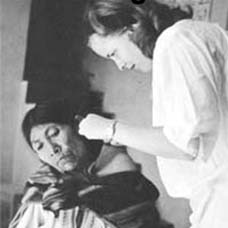
Nearly four years after Walter J. Poirier, a Peace Corps volunteer from Lowell, went missing, Bolivian and US authorities have made little progress in establishing what happened to him. Poirier's family and others familiar with the case say they believe the investigation has been bungled.
Family slams stalled probe of son's disappearance
By James Langman, Globe Correspondent | January 9, 2005
LA PAZ, Bolivia -- Nearly four years after Walter J. Poirier, a Peace Corps volunteer from Lowell, went missing, Bolivian and US authorities have made little progress in establishing what happened to him.
Because of the long passage of time, officials presume he is dead. But Poirier's family and others familiar with the case say they believe the investigation has been bungled.
His parents, Walter Sr. and Sheila Poirier, say that most recently, the US Embassy in Bolivia failed to follow up adequately on a lead from authorities in August in which a Bolivian kidnapping victim claimed to have overheard what happened to their son's body. The Massachusetts congressional delegation has also been critical of the investigation.
"I think this investigation has been mishandled since the beginning," US Representative Martin Meehan, Democrat of Lowell, said recently. "All the way down to the fact that Walter Poirier's family notified the Peace Corps that he was missing."
In 2001, a General Accounting Office investigation found the Peace Corps at fault, stating it had failed "to properly supervise Mr. Poirier and lost track of him."
Barbara Daly, a spokeswoman for the Peace Corps, said the agency is doing everything it can. "We have been investigating, and will continue to do so," Daly said from Washington.
Poirier, who joined the Peace Corps shortly after graduating from the University of Notre Dame in 2000, had been in Bolivia for about six months and was 22 years old when he was officially declared missing March 6, 2001. He had been assigned to work on an ecotourism project in the Zongo Valley, a mountainous, tropical forested region about two hours north of La Paz, the Bolivian capital.
But when his mother called after an unusual lapse in communication, she was told by his La Paz roommates that they had not seem him for weeks. She immediately called the Peace Corps office in Bolivia. Two days later, he was declared missing.
In his small room in the Zongo Valley, investigators found his wallet containing about $12, credit cards, and all of his personal IDs, suggesting that he had been there and had not strayed far.
Soon afterward, a search was conducted near his mountain home and places he frequented. The Peace Corps and US Embassy launched an extensive publicity campaign on Bolivian radio, television, and in newspapers. In addition, at the insistence of the Poiriers, the Corps recently boosted to $50,000 the reward for information leading to the recovery of Poirier's body. The Poirier family is financing half the amount.
But US authorities say they have gotten nowhere.
"The effort to obtain additional information on the disappearance of Walter Poirier has been extremely frustrating," the US Embassy said in a prepared statement. "Despite a number of apparently promising leads, every trail thus far has been unproductive."
In June 2004, under pressure from Meehan and US Senators Edward M. Kennedy and John F. Kerry, the Peace Corps agreed to hire a full-time investigator. The investigator, whom the agency will not identify, began work in late September.
But a Bolivian private investigator hired to assist the Peace Corps investigator said they still had not identified any solid leads nor finished reading the mounds of paperwork given to them to review when the Peace Corps investigator left Bolivia in mid-November. He was given six weeks to do an in-country assessment.
Raising hope for a break in the case, a formal criminal complaint was filed with La Paz police in August against two people in connection with Poirier's disappearance. In the complaint, which obliges the police to investigate, Ramiro Machaca, 22, a Bolivian Aymara Indian, said that he was kidnapped May 23, 2004, and held for six days in a Zongo Valley river tunnel near the Wahi electric plant.
Machaca, who worked at the Wahi plant, said that he was kidnapped because in February, while at work one evening at the plant cleaning the machines, he overheard two other employees discussing Poirier. Machaca said they were celebrating and drinking alcohol.
"One of them made a toast to el chango, Walter Poirier," Machaca said in an interview, using slang for "the kid." "Then they soon began talking about what they did with his body."
Machaca also said the two men said that the body was buried in the mountains below Zongo Pass, which rises above the valley.
But no formal criminal charges have yet to be filed against the two people accused in the kidnapping because the La Paz district attorney, Audelia Zurita, said they still need to compile more evidence.
Zurita said last month that the last time she was in communication with the US Embassy about the Poirier case was in late September. She said her office wanted to conduct a monthlong search for Poirier's body in the areas of Zongo identified by witnesses, but the US Embassy has said it would not provide the necessary specialists and equipment because it wants a more precise location for the body.
Walter Sr. and Sheila Poirier, meanwhile, say they believe that more can be done.
"We are perplexed as to why the embassy and Peace Corps have not embraced this lead," they said from Lowell in a joint e-mail. "The Poirier family cannot forgive the Peace Corps for their irresponsible practices, which we feel were largely responsible for our son's disappearance."
© Copyright 2005 Globe Newspaper Company.










